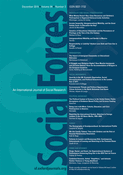-
Views
-
Cite
Cite
Matthew T. Loveland, American Catholics in Transition By William V. D'Antonio, Michele Dillon, and Mary L. Gautier Rowman and Littlefield. 2013. 216 pages. $80.00 hardback, $27.95 paper, Social Forces, Volume 94, Issue 2, December 2015, Page e51, https://doi.org/10.1093/sf/sou005
Close - Share Icon Share
Extract
Those who study American Catholics know that the diversity within the tradition requires more careful consideration than what is typically found in general sociology. As the number of Catholics who fit the “pay, pray, and obey” model becomes ever smaller and Catholic identity becomes increasingly complex, analysis of current, high-quality survey data about American Catholics is always welcome. Like the other titles in the well-regarded series of studies of American Catholics, American Catholics in Transition is a concise and thoughtful presentation of a wealth of such data. Arranging the book around themes that will be familiar to those who have read the earlier studies, William V. D'Antonio, Michele Dillon, and Mary L. Gautier provide wide coverage of American Catholic demographics, attitudes, and practices.
Twenty-five years of data allow for a convincing empirical analysis of stability and change among US Catholics. As is indicated by the title, the book emphasizes change, but readers will see stability in terms of core Catholic beliefs and appreciate that the findings are always well contextualized by the longer history of American Catholicism. For example, helpful reflection on the significance of the First and Second Vatican Councils adds theoretical weight to the interpretative work needed to make survey findings meaningful. Given that these events, especially Vatican II, are regularly referred to by scholars of contemporary American Catholicism to explain much of the tradition's dynamism, this book could become a regular citation in the sociology of Catholic life.



